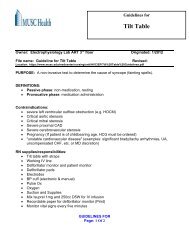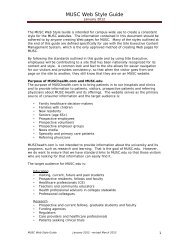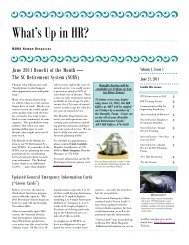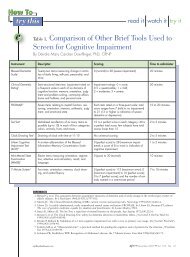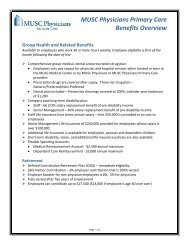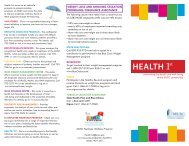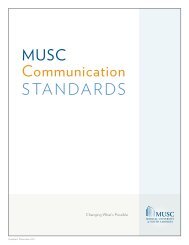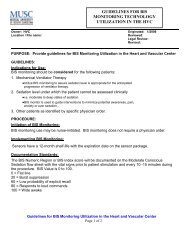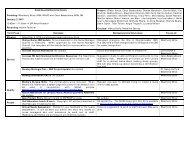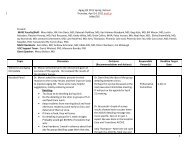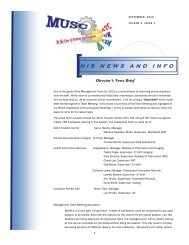"Medication Interventions for Fall Prevention in the Older Adult." J
"Medication Interventions for Fall Prevention in the Older Adult." J
"Medication Interventions for Fall Prevention in the Older Adult." J
Create successful ePaper yourself
Turn your PDF publications into a flip-book with our unique Google optimized e-Paper software.
Reviews <strong>Fall</strong> prevention <strong>in</strong> older adults10. For each psychotropic added to a patient’s drug regimen,<strong>the</strong> risk of falls isa. The same.b. Doubled.c. Tripled.d. Quadrupled.11. Buspirone conversion and discont<strong>in</strong>uance of psychotropicshas been shown to decrease falls by whatpercentage?a. 20%b. 40%c. 70%d. 90%12. Medicare will no longer pay <strong>for</strong> falls that occur <strong>in</strong>which care sett<strong>in</strong>g?a. Acute careb. Skilled carec. Assisted liv<strong>in</strong>gd. Personal care13. Recent literature <strong>in</strong>dicates that <strong>the</strong> number of hospitalizationsof residents of long-term care facilities isdirectly proportional toa. The number of adverse drug reactions and falls <strong>the</strong>yexperience.b. The number of adverse drug reactions <strong>the</strong>y experience.c. The number of falls <strong>the</strong>y experience.d. None of <strong>the</strong> above alternatives is correct.14. Which psychotropic class has been found to <strong>in</strong>crease<strong>the</strong> death risk <strong>for</strong> older adults with dementia?a. Anxiolyticsb. Antidepressantsc. Antipsychoticsd. Anticonvulsants15. The nurs<strong>in</strong>g home patient with which of <strong>the</strong> follow<strong>in</strong>gmay be more likely to receive pharmacologic “restra<strong>in</strong>ts”with psychotropics?a. Physically abusive behaviorb. Infrequent family visitsc. Severe cognitive impairmentd. All of <strong>the</strong> above alternatives are correct.16. Anemia <strong>in</strong>creases fall risk <strong>in</strong> which of <strong>the</strong> follow<strong>in</strong>g?a. Long-term careb. The communityc. Alternatives a and b are correct.d. Nei<strong>the</strong>r alternative a nor b is correct.17. Which may decrease fall and fracture risk?a. Vitam<strong>in</strong> Db. Calciumc. Alternatives a and b are correct.d. Nei<strong>the</strong>r alternative a nor b is correct.18. The best way to decrease psychoactive load is toa. Abruptly stop all psychoactives.b. Carefully taper to lower dose or stop one agent at atime.c. Taper slowly and watch <strong>for</strong> adverse drug withdrawaleffects.d. Alternatives b and c are correct.19. As a general rule, <strong>the</strong> half-life of a drug has what effecton <strong>the</strong> taper<strong>in</strong>g schedule?a. The shorter <strong>the</strong> half-life, <strong>the</strong> longer it takes to taper.b. The longer <strong>the</strong> half-life, <strong>the</strong> longer it takes to taper.c. The longer <strong>the</strong> half-life, <strong>the</strong> shorter <strong>the</strong> taper<strong>in</strong>g time.d. The half-life has no effect on <strong>the</strong> taper<strong>in</strong>g.20. <strong>Fall</strong> risk prevention and <strong>in</strong>tervention should be <strong>the</strong>responsibility of <strong>the</strong>a. Prescriber.b. Pharmacistc. Nurse and caregivers.d. All of <strong>the</strong> above alternatives are correct.CPE Process<strong>in</strong>g:Get your documentation of credit now! Complet<strong>in</strong>g a posttest at www.pharmacist.com/education is as easy as 1-2-3.1. Go to Onl<strong>in</strong>e CE Quick List and click on <strong>the</strong> title of this activity.2. Log <strong>in</strong>. APhA members enter your user name and password. Not an APhA member? Just click “Create one now” to open anaccount. No fee is required to register.3. Successfully complete <strong>the</strong> CPE exam and evaluation <strong>for</strong>m to ga<strong>in</strong> immediate access to your documentation of credit.Live step-by-step assistance is available Monday through Friday 8:30 am to 5:00 pm ET at APhA Member Services at 800-237-APhA (2742) or by e-mail<strong>in</strong>g InfoCenter@pharmacist.com.e84 • JAPhA • 49:3 • M a y /Ju n 2009www.japha.orgJournal of <strong>the</strong> American Pharmacists Association



